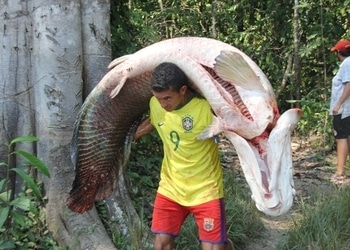The Battle to Save Brazil's Freshwater Giant, the Arapaima - InSight Crime

As the world's largest freshwater fish, the arapaima, is being targeted by poachers in Brazil, while members of Indigenous communities are doing their best to protect it.
The Paumari Indigenous community, which lives along the Tapauá river in the Brazilian state of Amazonas, has built 16 lakes dedicated to the sustainable fishing of the arapaima, known locally as the piracuru. The program started in 2009 when just 251 fish were counted. The arapaima population now numbers 1,835, fish, EcoDebate reported on December 9.
Elsewhere, fishermen in the Pixuna do Tapará Indigenous community in the state of Pará are also doing their best to sustainably harvest the arapaima.
Still, the fish, which can reach three meters in length and weigh over 200 kilograms, are believed to be critically endangered after years of overfishing. This year, authorities have made repeated seizures of illegally caught arapaima. In November, police seized 2.5 tons of arapaima on a boat traveling in the state of Amazonas, according to Globo.
SEE ALSO: A Roaring Trade: Wildlife Trafficking in Colombia's Amazon
September saw near-daily interdictions, culminating in the interception of a staggering 16.5 tons of illegally caught arapaima. One intercepted vessel held 12 tons of fish. That vessel was released and intercepted again less than 24 hours later with another 4.5 tons of fish on board.
Arapaima populations, which had fallen precipitously by the 1990s, are now protected by a state policy that imposes quotas and a six-month fishing season, as well as limiting their capture to within certified management areas.
A program also subsidizes licensed fishers during the closed season, effectively paying them not to fish. The policy has been highly successful, increasing local arapaima populations by over 600 percent in the last 12 years, according to reporting by one Brazilian media outlet.
However, an April article by environmental news outlet Mongabay found this recovery is plagued by poaching, which has surged amid the coronavirus pandemic, thanks to escalating poverty and reduced enforcement.
InSight Crime Analysis
The case of the Brazilian arapaima represents a creative – though not unusual – approach to tackling the illegal seafood trade. The country's post-1999 management policy effectively turned poachers into gamekeepers by making local communities the key stakeholders in conservation efforts.
Due to the fact it does not constitute a trade ban, fishers in certified management areas are also incentivized to protect arapaima stocks, which will then keep growing and allow for the gradual loosening of quotas, according to a briefing paper for the Convention on International Trade in Endangered Species of Wild Fauna and Flora (CITES).
In late 2020, Brazil's arapaima population was estimated to number over 330,000 across 35 managed areas, with over 930 fishery workers receiving subsidy payments for the closed season.
SEE ALSO: Coverage of Illegal Fishing
The problem, however, is that with increasing numbers of both arapaima and management areas, monitoring becomes harder and difficulties arise in differentiating legal from illegal catch, leading to extensive laundering, according to a 2020 report by the wildlife conservation NGO Traffic.
"It may not be a coincidence that there were spikes in seizures of illegal arapaima after the issuing of more permits to harvest the species," notes the report.
This year alone, some 1,037 metric tons of arapaima were caught legally. The large seizures certainly suggest a growing problem.
Selective enforcement, however, may also exaggerate the scale of the issue. In August 2020, Amazonian authorities set up along the Arpão River Base on the Solimões river, mostly to obstruct drug flows from Colombia and Peru. In its first year of operation though, authorities also seized 42.5 tons of illegal catch.
Was this content helpful?
We want to sustain Latin America's largest organized crime database, but in order to do so, we need resources.
DONATEWhat are your thoughts? Click here to send InSight Crime your comments.
We encourage readers to copy and distribute our work for non-commercial purposes, with attribution to InSight Crime in the byline and links to the original at both the top and bottom of the article. Check the Creative Commons website for more details of how to share our work, and please send us an email if you use an article.
Comments
Post a Comment